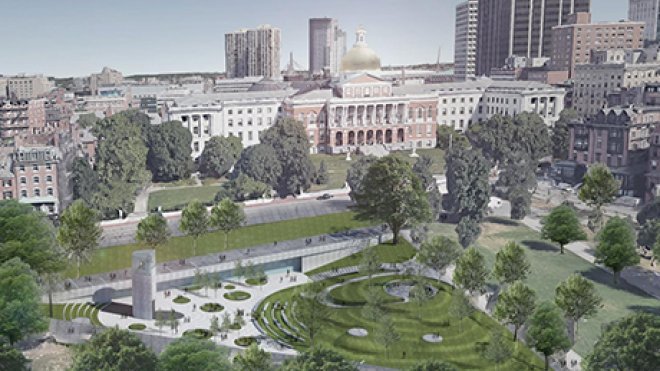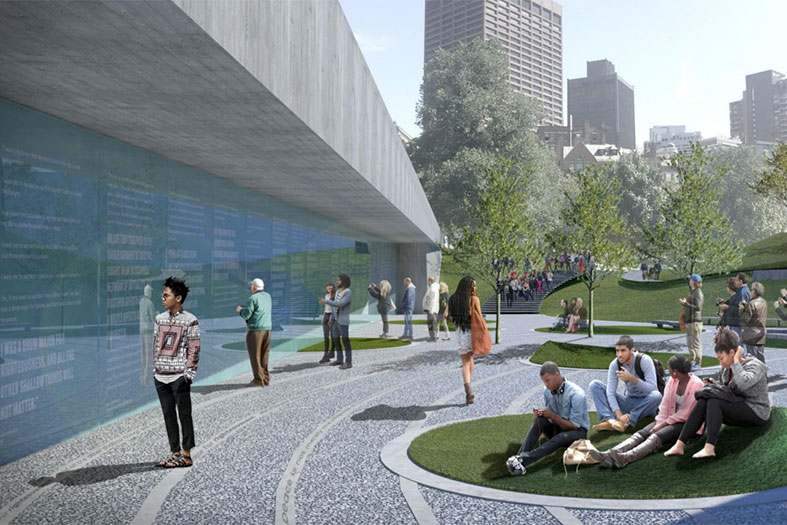Design by RWU Professor’s Architectural Firm Among Finalists for MLK Memorial in Boston
Professor Julian Bonder says “Ripple Effects” design would honor the Kings while inspiring contemporary activism

BRISTOL, R.I. – RWU Professor of Architecture Julian Bonder’s architectural firm is among five finalists to design a multimillion-dollar memorial to Rev. Martin Luther King Jr. and Coretta Scott King on the Boston Common.
Bonder is co-founder and partner in Wodiczko + Bonder, which had its design selected as one of the finalists from 126 design submissions. The design will now be open to public comment, along with the other designs chosen as finalists, before a winner is announced in November.
The Boston Common memorial is meant to honor both Kings’ time in Boston, the city where he earned his doctorate degree and where they met and fell in love. The chosen design will drastically change the makeup of the iconic park.
Bonder’s firm – which designed an award-winning Memorial to the Abolition of Slavery in Nantes, France – collaborated on the design with Maryann Thompson Architects and Walter Hood, creative director and founder of Hood Design Studio, in California. It honors the partnership between the extraordinary King couple and their accomplishments, while also establishing itself as a place to inspire civic activism.
"It is designed as a living memorial that must be continually reanimated and repurposed by the people who engage with it," Bonder said. “This would be the place for continuing the struggle for civil rights.”
Called “The Ripple Effects: Voice, Love, Non-Violence, Fellowship, Community, Justice, Action,” the design was inspired by a famous quote from U.S. Sen. Robert F. Kennedy on the ripple effects a person can have with their ideals and beliefs. “It comes from the notion that their words have spread around the world” like ripples in water, Bonder said.
The design has embraced the historic and unique task of creating a monument to a partnership of two extraordinary people, Bonder said. It features a pair of “Beacon Towers,” which combine symbolism with action, and include quotes by both Kings on love and activism. Through a specially designed lighting and sound system, the towers would be responsive to current civil rights events so that it can inspire reflection and action, Bonder said. Emanating from the Beacon Towers, in the surface texture of the Memorial Ground, are ripples that evoke the “ripple effect” of the Kings moral leadership.
“We’re still listening to their speeches, listening to their words and carrying on their unfinished work,” Bonder said. Their words and leadership “are key to understanding how to move forward.”
Other key features include a mound on the east side of the memorial that recreates a journey “to the mountaintop” and an amphitheater area at the bottom edge of the mound to create a space of gathering and interaction. Another important part of the memorial is the “Bridge” that stretches from the Robert Gould Shaw and Massachusetts 54th Regiment Memorial on Beacon Street to the Beacon Towers. A “Wall of Words” would stand on a portion of the Bridge, celebrating key civil rights moments.

“We want this to be a place of celebration and a place for action,” Bonder said.
The plans and design renderings for “The Ripple Effects” and the other design finalists will be on display at the Boston Public Library, in Copley Square, and the Bruce C. Bolling Municipal Building, in Roxbury, until Oct. 16, when public comment for the memorials will end.
The winning design will be selected in November by city officials and members of Martin Luther King Boston, the nonprofit group leading the memorial initiative.
To see the designs – including “The Ripple Effects” – and offer input, visit the MLK Boston site: http://mlkboston.org/art/.